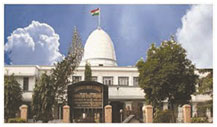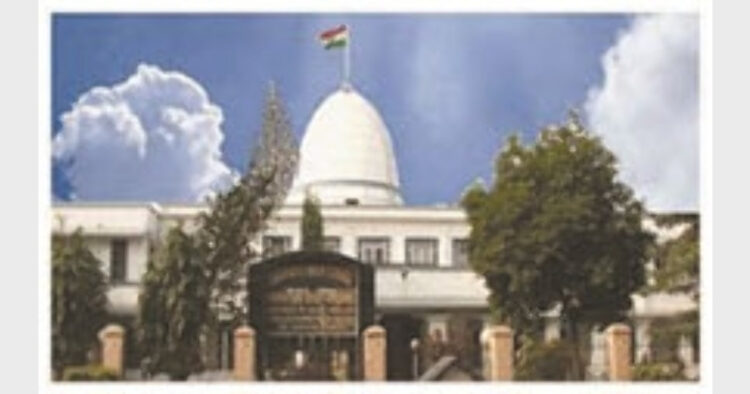 THE Guwahati High Court in a ruling on November 6, 2013, questioned the legal validity of the CBI. It said, “A careful reading of the preamble to the DSPE Act, 1946, would make it evident that the DSPE Act, 1946, has been made for the Union Territories. This legislative power cannot be exercised by the Parliament except under Article 246(4) of the Constitution, which enables the Parliament to enact laws on subjects covered by List-II (State List), in respect of Union Territories.” The court ruled, “We do hold that the CBI is neither an organ nor a part of the DSPE (Delhi Special Police Establishment) and the CBI can”t be treated as a “police force” constituted under the DSPE Act of 1946. We hereby set aside and quash the impugned resolution dated 01.04.1963 whereby CBI has been constituted.”
THE Guwahati High Court in a ruling on November 6, 2013, questioned the legal validity of the CBI. It said, “A careful reading of the preamble to the DSPE Act, 1946, would make it evident that the DSPE Act, 1946, has been made for the Union Territories. This legislative power cannot be exercised by the Parliament except under Article 246(4) of the Constitution, which enables the Parliament to enact laws on subjects covered by List-II (State List), in respect of Union Territories.” The court ruled, “We do hold that the CBI is neither an organ nor a part of the DSPE (Delhi Special Police Establishment) and the CBI can”t be treated as a “police force” constituted under the DSPE Act of 1946. We hereby set aside and quash the impugned resolution dated 01.04.1963 whereby CBI has been constituted.”
Allowing a writ petition filed by one Navendra Kumar, the bench quashed the chargesheet filed against him by the CBI but said the alleged offence could be investigated afresh by the regular state police. As a triggering effect, this judgment would render all chargesheets filed by the CBI till date invalid.”
The Central Government had set up altogether a new body known as CBI, by the impugned Resolution. Admittedly, at that time, no legislation was made, to set-up the CBI and the source of power being traced to Entry 8 of Part-I (Union List), which reads “Central Bureau of Intelligence and Investigation”.
The HC said: “The word “investigation”; was, therefore, according to the Constituent Assembly debates, intended to cover general “enquiry” for the purpose of finding out, what was going on and this “investigation”, which amounts to a mere “enquiry”, is not an “investigation” preparatory to the filing of charge-sheet against an offender, for, such an “investigation” can be carried on only by a police officer, under the Criminal Procedure Code, and none else.”
This apart, it is the State Legislature, which is entitled to constitute a ‘Police force’ for the purpose of conducting “investigation” into crime. From the above discussion, which took place in the Constituent Assembly, it becomes crystal clear that Parliament cannot, by taking resort to Entry 8 of List-I (Union List), make any law empowering a Police officer to make “investigation” in the same manner as is done, under the Criminal Procedure Code, by a Police officer while conducting an ‘investigation’ into an offence for the purpose of bringing to book an offender.
If the CBI is an integral part of DSPE, then such a resolution ought to have been issued by the Central Government in exercise of powers vested in the Central Government by the DSPE Act, 1946. In other words, had the CBI been constituted under the DSPE Act by the Central Government, the CBI could have been treated as having been created by way of delegated legislation. There is, however, nothing either in the DSPE Act or in the impugned resolution to show that the CBI is a creation of a delegated piece of legislation.
The Centre challenged on November 9, 2013, before the Supreme Court the Guwahati High Court order and sought a stay on it contending that the verdict will adversely impact thousands of criminal cases pending across the country. In its appeal, the Government sought an urgent hearing against the high court order saying it directly impacts about nine thousand trials currently underway and about one thousand investigations which are being undertaken by the CBI “if the impugned order is not stayed, it will frustrate the law machinery and may result in multiplicity of proceedings”.
“The order is already being seized upon by various accused persons in various proceedings in the country to seek a stay of further proceedings against them.” The Supreme Court has granted the prayer of the Government and stayed the order of the Guwahati High Court, and fixed the next date on December 6, 2013. Incidentally, the effect of High Court indirectly or directly means that cases like 2 G and Coal Scams and other cases investigated on the orders of the High Courts can not be initiated, unless those High Courts individually, Or Supreme Court stays the orders of the High Court, which it has done. A few lessons emerge from this entire episode. First of all, the Government should examine, closely, what Guwahati High Court has said, and if there are any deficiencies, the same should be rectified.
Secondly, the CBI should be given a ‘Constitutional Status’, like the Election or CAG, so that this problem is ended once for all. At the same the time the outmoded laws, where even if a person is caught red handed in bribery cases, there should be a provision of a summary trial, as well as confiscation of his property. Thirdly, the onus of proving that whatever assets a public servant has in possession should lie on the accused that all this is result of honest earning.
There are 32 million court cases pending in India, and the strength of the judiciary which even as per the recommendation of the Law Commission in 1988 should be 50 judges per million. By that calculation, we need over 70,000 judges, where as the actual number in position is less than 1,400 all over the country. Even in Supreme Court and High Courts, where the sanctioned strength is 895, there are 282 vacancies. The Government has taken no action on the orders of the Supreme Court to given functional autonomy to CBI, nor almost all State Governments have acted for reforms in the Police, all over the country, on September 22. The Central Government should give a lead at least in implementing the same in the Union Territories. It should set an example to the states, as setting an example is not the means of influencing others. Infact it is the only means.













Comments